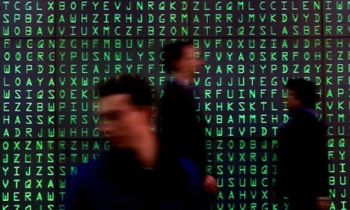Fruit cups and tea were served, and then came the matinee feature: a documentary about the Arabic broadcaster Al Jazeera, full of American bomb bursts and bloodied and bandaged Iraqi children.
At an international trade show for television programming on the French Riviera recently, Al Jazeera presented the documentary, "Control Room," to promote an English-language news channel it plans to introduce next year. While the setting, a crimson salon in the Majestic Hotel, suggested just another ambitious broadcaster rolling out a new service, the graphic images on the screen demonstrated how Al Jazeera, scourge of the Pentagon and some Middle Eastern governments, is decidedly different.
Al Jazeera, which styles itself as an independent voice in a turbulent region that is short on press freedom, is shaping its new channel, Al Jazeera International, with the same spirit: outspoken and unwilling, in its own words, "to sanitize war." Al Jazeera's aggressive journalistic style has led to its reporters' being banned from Iraq, Iran and Saudi Arabia. It has also inspired new competition from the likes of the BBC, which announced plans last week to start an Arabic-language news channel.
But Al Jazeera's approach complicates the job of selling the English-language service to broadcast outlets and potential advertisers. Only days after the convention in Cannes, the Arabic-language channel broadcast a videotape from Osama bin Laden's No. 2 man, Ayman al-Zawahiri, the latest in a series of videos from Qaeda leaders shown on Al Jazeera. A Spanish court recently convicted one of the channel's reporters of collaborating with the terrorist organization, a decision that the broadcaster is appealing.
With the expected start of Al Jazeera International about six months away, the broadcaster faces some pressing questions: Given the notoriety of Al Jazeera, will the English-language service be able to persuade enough satellite and cable services to carry it, particularly in the U.S. market? Will advertisers sign up, or will they prefer to steer clear of associations with Al Jazeera?
"Al Jazeera is a controversial channel, and I don't think the positions of the new version will be all that different," said Oussama Jamal, managing director of Starcom Egypt, a company that buys TV time on behalf of advertisers. "Some clients don't want to associate themselves with news and politics in this way."
In a surge of hiring intended to make Al Jazeera International palatable to Western viewers and advertisers, the channel has secured the services of high-profile television personalities like David Frost, the veteran BBC interviewer, and Josh Rushing, who was a U.S. military spokesman in the current war in Iraq. From CNN, it has added the anchor Riz Khan, and from Sky News of Britain, the reporter David Foster.
Al Jazeera offered few details on the expected content of the English-language service, or on the salaries of some of its prominent hires. It said the service would broadcast 24 hours a day, seven days a week, with a mix of news, discussion programs and documentaries.
Al Jazeera International said it would be editorially independent of its Arabic sister organization but would draw on that broadcaster's resources "where appropriate."
"We are catering to a global audience and will be committed to presenting all sides of an issue," a spokeswoman, Charlotte Dent, said by e-mail.
Nigel Parsons, managing director of Al Jazeera International, said he was pleased with its preparations, though he said patching together a global distribution platform through cable and satellite operators remained "a work in progress." He said the channel would be happy to be able to reach 30 million households globally when it was introduced.
"We hope we would be judged on our merits but recognize that we may be seen as a sister channel" of the original, controversial Arabic-language channel, he said by telephone.
But even before the English-language channel starts broadcasting, Al Jazeera faces the prospect of new competition - for its original Arabic-language news service and for Al Jazeera International.
BBC World Service, a government-financed offshoot of the BBC, has announced plans to start television news broadcasts in Arabic in 2007, shifting resources away from Eastern Europe. And Al Arabiya, a Dubai-based commercial broadcaster, is studying the idea of creating an English-language news channel of its own, said Jihad Ali Ballout, a spokesman.
The development of an Arabic-language BBC channel is a particularly intriguing twist in that market, both for viewers and for television journalists. The BBC briefly had such a news service from 1994 to 1996, broadcast to the Middle East in partnership with a Rome-based company linked to the Saudi royal family, Orbit Communications. The service was canceled over editorial disagreements, and many of the journalists who lost their jobs went on to work at Al Jazeera, which was starting up around the same time.
With a budget of £19 million, or $33.7 million, provided entirely by the British government, BBC Arabic Television will get around one of the biggest business problems with international television news. For the most part, analysts say, these services lose money and must rely on generous donors. In the case of Al Jazeera, that is the emir of Qatar; Al Arabiya draws financing from Saudi business interests.
New competition could affect a range of Arabic-language broadcasters in the Middle East, including Al Hurra, which is financed by the U.S. government. But analysts say the BBC could face a difficult challenge in going up against Al Jazeera and Al Arabiya, which have filled a void in the market for regional TV news coverage.
Meanwhile, with its English-language news channel, Al Jazeera is taking the battle of words and images in the other direction, offering competition for the BBC as well as other news channels like CNN in their more traditional markets.
In Cannes, at the Mipcom trade fair, Al Jazeera International's newly hired managers roamed the bustling Palais des Festivals in search of potential distributors. Some deals have been signed to carry broadcasts, said Jill Grinda, distribution manager for Europe and Asia, but she declined to identify the companies or their home countries.
Grinda said Al Jazeera was talking to "the dominant players with the largest number of subscribers in their countries," while Parsons, the managing director, said there were some "hot prospects" for U.S. distribution, though he acknowledged that negotiations there were difficult.
"This is undoubtedly not just because of the level of disinformation about what Al Jazeera is," Parsons said. "Cable operators, rather sadly, say Americans are not interested in international news - which is a shame, because we want to be a conduit for understanding between different cultures."
He said that the channel would have a natural appeal to growing Muslim populations in Europe but that Al Jazeera International hoped for a wider audience.
David Walker, television buying controller at Initiative, a firm that buys TV advertising time for marketers, said the new channel could attract sizable audiences, pointing to the popularity of Al Jazeera's English-language Web site.
"With the changing environment in the Middle East," he said, "there is no obvious reason that an English-speaking Al Jazeera will not find an important place within the overall news arena in the U.K."
Asia, with its growing Muslim and English-language audiences, could be an attractive market. Last week, executives of Al Jazeera International were in Hong Kong at a convention of the Cable and Satellite Broadcasting Association of Asia, talking to potential outlets like Astra, a Malaysian satellite operator, Grinda said.
Whether large audiences translate to advertising revenue is another matter, given that Al Jazeera's Arabic news broadcasts have attracted relatively little advertising, despite high viewership. Media buyers say many marketers in the Middle East prefer to steer clear of international news channels, opting instead for local entertainment programs. In the past, Al Jazeera's advertisers have included U.S.-based multinationals like General Motors and Procter & Gamble.
Parsons said that the channel would like to generate "significant revenue streams" within three to five years but that these could come from a variety of sources including, for instance, commercial sponsorship of segments like weather forecasts. Al Jazeera International executives in Cannes were saying little about the programming lineup for the new channel, other than that it would feature an interview-format program with Frost, to be based in London, and a live daily Washington program with Khan as host and produced to allow interaction with viewers.
One of the most interesting hires is Rushing, a former Marine spokesman who features prominently in "Control Room," the documentary by Al Jazeera. Rushing, who left the Marines last year, did not make an appearance at Cannes. A spokeswoman said he had "other commitments." Parsons said Rushing could help Al Jazeera International fill a unique role as a builder of bridges.
"While America is often bad at understanding the rest of the world," he said, "the rest of the world is bad at understanding America."
Eric Pfanner reported from London and Doreen Carvajal from Cannes.









